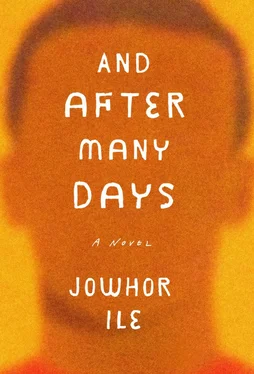Jowhor Ile
And After Many Days
For my mother and my father, Nma ya Pagem
Mercy Ebere and Edwin James Ile,
stars in my firmament.
Paul turned away from the window and said he needed to go out at once to the next compound to see his friend. It was a Monday afternoon in the rainy season of 1995. Outside, the morning shower had stopped and the sun was gathering strength, but water still clung to the grass on the lawn. “I’m going to Fola’s house,” he said again to his brother, Ajie, who was lying on the couch, eyes closed, legs hooked up the back of the chair. If Ajie heard, he gave no sign.
Ajie sighed as a woman presenter’s voice came on the radio, cutting through the choral music. “Why do they always interrupt at the best part?”
Paul floundered by the door as though he had changed his mind; then he bent to buckle his sandals, slung on his backpack, left the house, and did not return.
At least that is one way to begin to tell this story.
Things happen in clusters. They would remember it as the year the Mile Three ultramodern market burned down in the middle of the night. The year the trade fair came to town and the Port Harcourt city council, in preparation for the major event, commissioned long brightly painted buses that ran for cheap all the way from Obigbo to Borokiri (a full hour’s journey for a mere two naira!). It was the year of the poor. Of rumors, radio announcements, student riots, and sudden disappearances. It was also the year news reached them of their home village, Ogibah, that five young men had been shot dead by the square in broad daylight. The sequence of events that led to this remained open to argument.
Ajie stretched out and yawned, then dropped his arm and let it dangle from where he lay on the couch. He heard the gate creak as Paul let himself out, and the house fell back to the radio music and the sound of Bibi, their middle sister, blow-drying her hair in the bathroom.
Ajie and Bibi were due back in school that weekend. Their tin trunks were packed, school day uniforms already ironed and hanging, waiting in wardrobes. Ma went through the school lists, as she always did before the start of each term, checking to see that everything had been bought. Paul had finished his final school certificate exams in June, so he stayed at home while Ajie and Bibi spent hot afternoons at Mile One Market with Ma, buying school supplies for the term: textbooks, notebooks, buckets, mosquito nets, provisions, T-squares, drawing boards, four figure tables, cutlasses, brooms, and jerricans.
Their father, Bendic, had decided that since Bibi’s school was on the outskirts of town, she would be dropped off on Saturday evening. Ajie’s school was four hours away, so they had reserved all of Sunday for his journey. The blue Peugeot 504 station wagon was sent to the mechanic for servicing. For a whole afternoon their driver, Marcus, sat under the guava tree and read a paper and fanned himself, and when the cloud changed face, he carried his seat into the gatehouse, where Ismaila had a little pot set on the stove. The pot boiled and the lid clattered against the rim, letting go a fold of steam that escaped through the windows into the trees outside, and the sharp scent of dadawa sauce reached toward the main house.
—
The day before, Bendic had called Ajie and Bibi into his study as he prepared letters to their guardians. Bibi’s guardian was an agile, muscular woman whom Ajie had seen once during a visit to Bibi’s school; he had assumed from the woman’s air of personal authority and wide, relentless hips that she was the school’s matron. Bibi later told him she was a mere agriculture teacher and nothing more. Ajie’s guardian, Mr. Onabanjo — school bursar, head of accounts — was far too busy, thankfully, to nose about, as some guardians did their wards. Bendic’s pen scratched noisily across the smooth lineless paper — curved generous loops, downward slants, and furious dots at the end of sentences. For a moment, Ajie imagined himself one of his father’s clients as he stood by the large teak table, taking in the heavy green of the damask curtain, the black buff leather chair, the scattering of papers held down by paper holders, and imposingly behind Bendic, the hard shelves with rows of thick volumes. Their father often brought his work home, but he rarely discussed the cases. Ajie imagined how Bendic would speak to his clients: courteously, with a measured tone and lawyerly understanding.
Bendic’s pen finally stopped moving. He handed them the letters and leaned back in his chair as they proofread. He often told them it was foolish and dangerous to carry a letter without knowing its content. “You might be carrying a document instructing that you be sold, and you wouldn’t know it. Won’t read and can’t read land you at the same place.” Bibi always laughed about this when their father wasn’t there. She would yelp like someone from the TV. “How ridiculous!” she would say, shaking her head. “Who buys people, anyway? Who hands someone a letter saying that the mail carrier should be sold?”
—
By the evening of the day Paul disappeared, there was some concern regarding where he might be, but everyone believed he was on his way back, that he would show up at any minute. The creak from the gate each time was him. Bendic didn’t go into his study to work for an hour or so, as he often did. He came out to the parlor and stood by the room dividers, buttoning his shirt, though his eyes were fixed on Ma. “I’m just going to walk to the gate,” he said, and Ma nodded, murmuring a response but never looking away from the pile of papers she was marking on the dining table. She shuffled some and then set them aside. “Bibi, please see that the phone receiver is properly placed.” Bibi picked up the receiver and dropped it gently. A click escaped, and then she picked it up again and replaced it, just to make sure.
Bendic came back a few minutes after. Ma looked up at the door hopefully as he walked in. “Nothing,” Bendic said, “but there’s still time.”
They sat in the parlor until long after midnight. Twice the lights went out, but no one moved or even muttered “NEPA!” with the usual irritation. The lantern stationed in the passage stayed trimmed low, casting a yellow light beside the eddying shadow of the curtain hem. Generator engines started up in nearby compounds, one after another, and then together became a steady roar for several minutes until power was restored and ordinary quiet returned as the engines were killed off. The silence was so sudden and pure, it seemed as if the clock on the parlor wall had come to life, the slender second hand scratching its halting way around like a cripple.
Bendic looked up at the clock. “It’s way past your bedtime,” he said to Bibi and Ajie. He took off his glasses and wiped the lenses slowly with the edge of his wrapper. “Wherever your brother is, he has probably decided to sleep there tonight. It’s too late for him to be on the road. We will see him in the morning.” Bendic said the last sentence with conviction, as if he had kept Paul somewhere safe for the night and would make sure to call him out in the morning.
Ajie found it easy to fold himself into Bendic’s confidence: The calmness in his father’s voice, the certainty, felt much better than the roar of noises in his own head. Bibi was standing behind the sofa where Ma sat, her hand on the headrest beside Ma’s dark, straightened hair, and Ajie could tell Bibi didn’t want to go to bed, either.
“But sleep where?” Ma’s voice rose sharply. “Where could he have gone that he cannot return home tonight? I don’t understand the meaning of this nonsense.”
Читать дальше












